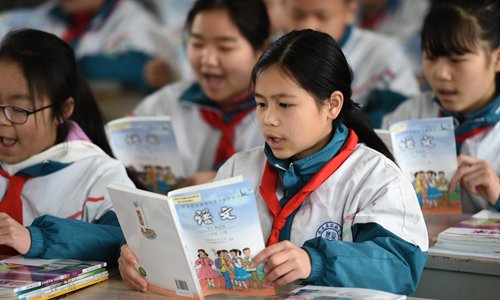
Students at a primary school in Yuqin county, Southwest China's Guizhou Province read from their yuwen, or Chinese-language, textbooks. With the conclusion of the winter vacation in late February, 2019, the new semester has started at primary and high schools across the land. Photo: VCG
China's education authority issued a regulation on Tuesday banning primary and junior high schools from using overseas textbooks, which analysts believe will help improve teaching quality, build academic autonomy and protect the copyright of overseas books.
The Ministry of Education published the regulation on the management of school teaching materials on Tuesday on its website, requiring primary and junior high schools to stop using textbooks by overseas publishers.
If domestic textbooks can't meet their needs, high schools, vocational schools and Chinese-foreign co-run schools could use overseas textbooks and are encouraged to use foreign textbooks that have been translated and published by Chinese publishing houses.
A report by Guangzhou-based southcn.com on Tuesday said some schools in Guangzhou, South China's Guangdong Province have used overseas textbooks as a supplement to their English teaching. Most of the local schools said the new regulations will have little impact on their teaching as they had already made adjustments to their curriculum.
Chu Zhaohui, a research fellow at the National Institute of Education Sciences, told the Global Times on Tuesday that overseas textbooks that have been introduced by domestic publishers are not regarded as overseas textbooks, citing the popular language textbook New Concept English as an example.
Some domestic publishers have changed the content of overseas textbooks without permission, and some schools have replaced national curriculum materials with such textbooks, media reported.
Chu pointed out that some teachers handed out photocopies of overseas books to students. Such unauthorized materials are of uneven quality and could violate copyright, he said, noting the new regulation can help guarantee the quality of textbooks and education and prevent legal risks.
Authorities and schools can integrate good content and educational experience of foreign countries into domestic textbooks in accordance with regulations to improve the compatibility of these textbooks, Chu said.
In the wake of booming academic exchanges under China's opening-up policy, which will continue, the regulation guarantees the country's autonomy in education instead of following foreign education blindly, Chu said.
The State Council in July 2019 said primary and junior high schools, which belong to the compulsory education in China, are not allowed to use unauthorized textbooks or introduce foreign curriculums.
A mathematics teacher surnamed Tang, from a Shanghai-based junior high school which offers an integrated international curriculum, told the Global Times that international schools would be affected more by the regulation as some only recruit foreign teachers and use overseas textbooks for certain subjects.
A parent surnamed Lou from Shanghai noted that students can still read additional overseas textbooks based on their own interests under parental supervision, which can enrich a student's knowledge.
The regulation also said education authorities should revise the textbooks when the books have big disputes.
If an article in the textbook is negative and if the author's historical evaluation or social image is negative, or if there is a major dispute, the article must be replaced, the regulation said.
Textbook writers and editors, whose values and morality are negative or controversial, must be replaced, it said.




